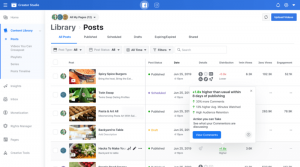Are you in the process of creating a website for your small business? If so, you’re not alone. There’s so much you have to consider when you want to take your business to the digital world. SEO, website design, and obtaining customers can seem overwhelming in the early stages of development.
Today we are going to share four tips that will help ease the process of launching your first websites — the advice we are covering today cover growing your audience, building loyalty, and improving SEO.
Let’s dive in!
Create a Coming Soon Page
The key to getting traction for your website is building a coming soon page. Essentially, coming soon pages are placeholders that will show up when someone types in your URL, they also set expectations for visitors. You should show the following information to people who visit your website before it goes live:
- Countdown timer showing the launch date
- Information about your website (what do you do? What problem do you hope to solve?)
- Contact page for consumers that have questions pre-launch
- The option to sign up for your email list for new updates
- Social sharing buttons
Here’s an excellent example of a coming soon page that checks all the boxes:

Plan and Create Blog Content
Blog content is essential to all websites. Ecommerce storefronts, SaaS businesses, and academic facilities all have comprehensive blogs that they use to improve their SEO ranking and spread brand awareness.
If you’re creating your first website, you must research your target audience and come up with content that they will find relevant. We suggest trying a tool like Answer the Public to come up with ideas for your website’s blog.
Before your launch, create ten pieces of content and add it to the website so users will stick around and engage with your brand. Additionally, you should schedule at least one month’s worth of articles to release on a set schedule.
Don’t forget to research keywords in your industry by using Google’s keyword planner. You should look for keywords that get between 500 to 1000 searches a month and work on fitting those keywords organically throughout your content. This step will ensure that Google crawlers can recognize your intent and index your site correctly.
Look for Guest Posting Opportunities
Guest posting is an excellent opportunity for people that want to tell people about their business, but haven’t finished developing their website. Essentially, guest posting is when you write an article for another publication with a link to your coming soon page, and soon-to-be live site.
You can include the link in your author bio, or within the content, if it’s natural, and approved by the head editor or in the writing guidelines. There are tens of thousands of publications worldwide; it’s safe to say that you can find a website in your niche that’s accepting guest posts.
Finding guest posting opportunities is a breeze if you know how to look. Start by searching Google for your keywords or industry-specific phrases. The results will show some of the most influential websites for those words. These websites have higher domain authority and can help you reach a larger audience pre-launch.
Research the websites that interest you (or your target audience) and take notes. Write down the name of the editor, find out if they are accepting guest posts, and analyze their content. Look for style choices and try to make your pitch fit the tone of their publication. Some people will recognize your pitch, and others will never email you back. You have to keep trying, and you will get your pitches accepted.
As a bonus, many guest posts get shared on the publication’s often large social media channel. When you consider that there are over 3 billion people on social media, this is a great opportunity to spread brand awareness.
Start Engaging with Your Email List
Email marketing is, without a doubt, one of the best ways to get people hyped about your new business. Many analysts think that the number of email users will reach 4.4 billion by the end of 2020. You can bet that your target audience uses email, and would love the opportunity to engage with your brand.
Once you start gathering leads with your coming soon page, don’t forget to start engaging with your new followers. The people interested in your product or service can provide you with a wealth of information about your target audience, including their goals, pain points, and demographics.
The more you know about your audience, the better chance you have of building a successful business. Personalization is a big deal for many consumers, so understanding what they want and delivering them information through email can help you turn subscribers into customers when your site goes live. One study revealed that personalized email messages tend to get around 26 percent more opens!
You could send your new subscribers special promotions that they can use on launch day. Some businesses will send their email followers the blog posts that will go live day one early. This is an effective tactic that will help you win favor in the eyes of your new subscribers.
Conclusion
Launching a website for the first time takes plenty of work and preparation. It’s possible to flip the switch and see plenty of sales and engagement day one of your new websites. Use these tips to ensure that you are getting indexed early by Google, spreading brand awareness, and growing as an expert in your industry before your website goes public.
Business & Finance Articles on Business 2 Community
(57)







